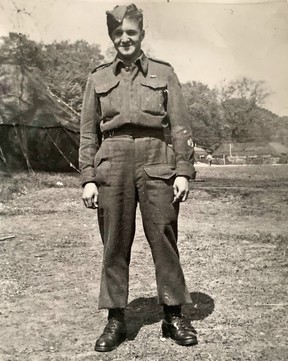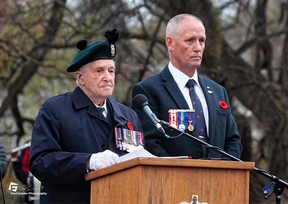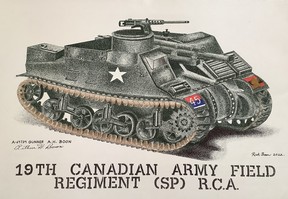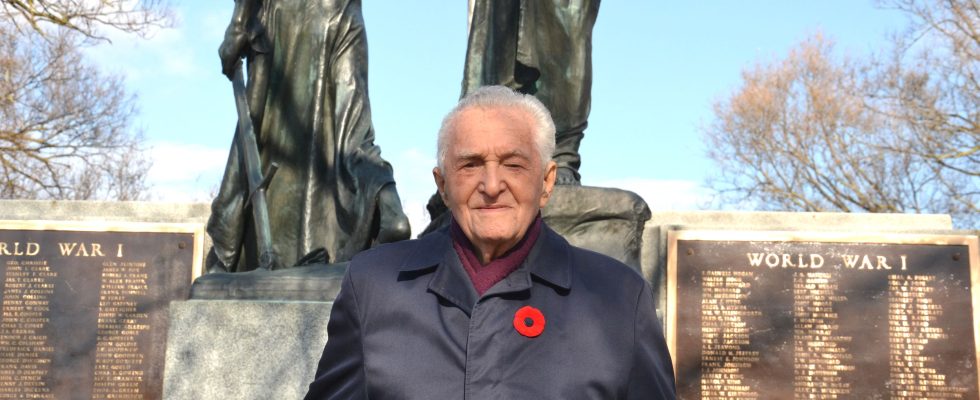Arthur Boon, a Stratford veteran of the Second World War who fought in the D-Day invasion of Normandy and the Liberation of the Netherlands, died Sunday at the age of 98.

Nothing was more important to Arthur Boon than honoring his duty to country, community and family,
Arthur, who died Sunday at age 98, spent his entire life doing right by that personal code. Spurred on by his father’s stories of fighting in the First World War, Arthur, known to friends and family as Art, enlisted in the military at the age of 15, just as the Second World War broke out in Europe.
Though he was discharged after a few months of basic training when his uncles, serving in the Perth Regiment, told officers he was under age, Art soon re-enlisted with the 19th Field Regiment to continue his training and help train others before finally getting his chance to serve overseas.
At just 19 years old, Art’s first taste of war came as part of the pivotal D-Day invasion of Normandy on June 6, 1944.
“That was his first action at D-Day,” said Art’s son, Rick Boon. “Think about that. Your first real gunfight.”
Serving as a tank gunner, Art and his crew endured the immense physical and mental tolls of war, which, for Art, included lifelong post-traumatic stress disorder, a shrapnel-severed thumb that was reattached and serious burns to the left side of his body when his tank was hit by enemy fire. Still, Art and his crew persevered as they assisted with the Liberation of the Netherlands.

Despite all that hardship, Art never turned away from his duty to his fellow soldiers and his country.
“Art was not only a local treasure, but he was also a national hero. … From the Beaches of Normandy to the liberation of the Netherlands, Art Boon lived history and made history. When Art landed on Juno Beach in the early morning hours of June 6, 1944, he would not have known whether he would live to see another sunrise, but thank God he did. His service helped to turn the course of history and his character made him great. … I treasured my many conversations with Art. … When listening to Art speak, members of our generation needed no reminder that we were hearing an eyewitness account of the great turning points in history.
“Although he lived a remarkable 98 years, I share the sorrow and sadness of so many in our community who felt like Art would always be there. I am eternally grateful for his service.” Perth-Wellington MPP John Nater said.
Though he was still a young man when the war ended, his experiences on the battlefield shaped the course of his life. Having made a name for himself as a hockey player that could skate faster than anyone else on the ice, Art played for the Canadian National Army Hockey League in Amsterdam and the traveling Canadian All-Star team after the war ended to help raise money for the Netherlands Relief Fund.
“My mom said they basically couldn’t catch my dad,” Rick Boon said. “He was that fast a skater.”
After returning home to Canada, Art was invited to attend the Detroit Red Wings training camp in 1949 and 1950. Had it not been for his ailing father, who couldn’t work as result of a shrapnel injury he received while fighting in the First World War, Art would have been on track to play for the American Hockey League and, potentially, the Red Wings. Instead, he decided to put his family before his hockey dreams and returned home to help.
“This is just part and parcel for my dad’s personality. Hockey was really important to him but family was more important,” Rick said. “He went home to support my grandmother, who was caring for my aunt, who had Down syndrome, and then he had two younger brothers and my grandfather was ill and couldn’t work.
“So he said, ‘No, I have to come home … and support my family.’ I said to him a while ago, ‘Do you think you had a shot (playing for the Red Wings)?’ He said, ‘Yeah, (but) I had to go.’ … Like he had to go to war to support the country, he had to come home and support his family. And he did the same thing with my brother and I and our mom. He’s always been there for us. It’s a pretty big hole (in my life).”
After meeting and marrying the love of his life, Lois Pope, on his return to Stratford and receiving his formal military discharge in 1946, Art re-enlisted with the Perth Regiment in 1956 after a brief stint working at the Canadian National Railway shops in Stratford . He transferred to the 3rd Battalion of the Royal Canadian Regiment in 1964 as a staff sergeant, was promoted to company sergeant major and then again to chief warrant officer of the 4th Battalion of the Royal Canadian Regiment before he retired from the Canadian Armed Forces in 1981 .
But his work didn’t stop there. Art dedicated his “retired” years to ensuring his fellow veterans received the care, recognition and government support they deserved, working as a life member of the Royal Canadian Legion, a member of the Army, Navy, Air Force Veterans Association, and a member and past-president of the Royal Canadian Regiment Association, the Perth Regiment Veterans’ Association, the Fourth Royal Canadian Regiment Officer’s Mess and the 19th Field Regiment Association, among numerous other organizations and roles.
“He became a service officer for the legion, for Veteran’s Affairs. … He fought to get people their pensions if the government wasn’t going to give them, (and) for widows to give them a roof over their head because their husbands weren’t there to work anymore. He was diligent and he was at the legion all the time. … He was always working and people would call our house and say, ‘I need this or that.’ … That whole concept of making sure that people are recognized and respected and taken care of was something that he lived for,” Rick said.
Stratford Royal Canadian Legion president Steve Zurbrigg admired his friend’s dedication to helping other veterans.
“He connected a lot of veterans to Veterans Affairs and getting them help. … He’s had quite an influence. Certainly from his military time, he trained a lot of people from Stratford and influenced a lot of people in remembrance and their view of the Second World War. … He had a lot of drive. He wanted things done right, but he would work with people so he got a lot out of people that others wouldn’t have. He was an inspiration and an example to follow,” Zurbrigg said.
Art, a dedicated historian and lively storyteller, was also curator of the Perth Regiment Museum before it was relocated from the Stratford Armory to the Stratford Perth Museum. He was also largely responsible for Stratford’s Remembrance Day ceremonies being what they are today, having organized them in such a way that they mimicked the national ceremony in Ottawa. Up until his death, Art led or participated in every local Remembrance Day ceremony since he returned from the Second World War in 1946.

And that idea of remembrance wasn’t something Art just encouraged each year on Nov. 11.
“I had dad come into the classroom every year. … It didn’t matter if it was a Grade 2 class or up to Grade 8, he was talking to them. … Dad was never a speaker. He was always just kind of a quiet guy, but he felt that to get the message out to the new generation and make sure all the efforts he made and (those of) every Canadian veteran who either died or came home weren’t going to be forgotten, said Rick, a longtime school teacher.
“He was darn determined to make sure that kids knew war wasn’t glamourous. That was one of those things he’d say at the beginning and at the end. ‘War wasn’t glamorous. We did what we did to fight for freedom so you can have the life you have today.’ ”
As Art got older, Rick said he treasured the time he spent with his dad, serving as his right hand so Art could continue fulfilling his duties and attending remembrance and anniversary ceremonies across the country and around the world.
Over the past two years, Rick said he had the opportunity to sit with his dad and interview him about his life, with the goal of some day writing a book about Art’s life, his military service and his unwavering dedication to family, community and country .
“I said to him just the other day, ‘No matter what happens and wherever we end up going in the next little while, I will be your representative.’ … I want to make sure everything he’s put in place stays the same and it doesn’t get tarnished or watered down. … I will continue that to the day I can’t anymore. … Any honor that he’s supposed to get or anything that he’s supposed to attend, I am going to attend in his honour,” Rick said.
The arrangements for Art’s visitation and funeral are still being made.


Comments
Postmedia is committed to maintaining a lively but civil forum for discussion and encourages all readers to share their views on our articles. Comments may take up to an hour for moderation before appearing on the site. We ask you to keep your comments relevant and respectful. We have enabled email notifications—you will now receive an email if you receive a reply to your comment, there is an update to a comment thread you follow or if a user you follow comments. Visit our Community Guidelines for more information and details on how to adjust your email settings.
Join the Conversation